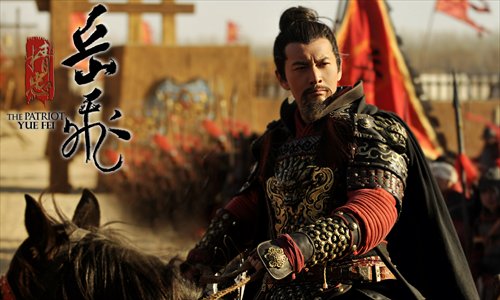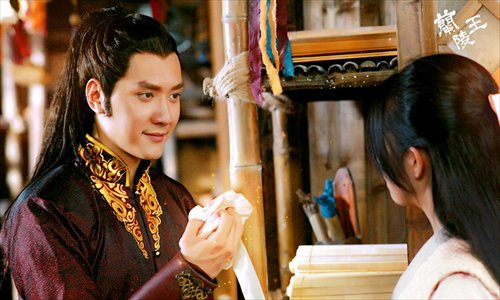The siren call of TV
By Southern Metropolis Entertainment Weekly – Global Times Source:Southern Metropolis Entertainment Weekly – Global Times Published: 2013-10-22 19:38:01

The Patriot Yue Fei Photo: CFP

Little Daddy Photo: CFP

Lanling Wang Photo: CFP
For a long time, TV stars viewed films as the next step in fame. Now, this mindset has reversed, as more and more well-known movie stars are eager to go back to soap operas. The increasing quality of these serials is attracting a new caliber of talent.
The TV adaptation of Red Sorghum, set to air next year, sees actress Zhou Xun - who recently starred in films Painted Skin: The Resurrection (2012) and Cloud Atlas (2012) - picking up the leading role, 10 years after her last TV drama appearance in Maiban Zhi Jia (2003).
Just a few months ago, popular TV dramas The Patriot Yue Fei and Lanling Wang brought cinema stars Huang Xiaoming and Feng Shaofeng back to their TV drama roots.
And in perhaps the most high-profile example of this trend, international starlet Fan Bingbing is slated to take the lead role in Wu Zetian, a TV drama about to start shooting next year.
Bigger paychecks
The rising payment for TV dramas has been regarded as the most influential factor behind the migration of acting talent to the small screen.
About 10 years ago, a new-name actor could earn several thousand yuan per episode and first-rank actors could take home an income of 200,000 yuan ($32,750) to 300,000 yuan. That figure remained stable for many years.
For example, popular Chinese mainland actor Chen Daoming was reportedly earning less than 8 million yuan for the 2010 30-episode TV drama Shouji (Cellphone).
A windfall of hot money began to enter the TV industry about three years ago, lifting actors' payment at the same time. Actor Wen Zhang, who graduated from The Central Academy of Drama in 2006, now receives nearly 1 million yuan per episode, after acting for less than 10 years.
On the other hand, for a mid-budget movie with a roughly 30 million yuan investment, 20 percent of that goes to pay the top-billed actor. According to the agent of an A-list actress, such a payment wouldn't be much after taking out the costs for a star to prepare for a movie.
Not just an actor
In recent years, an increasing number of actors aren't satisfied with only acting credits. They want to be an investor, a producer or even the director.
TV shows provide a stage for stars to have a bigger voice. The Patriot Yue Fei had investment from actor Huang Xiaoming's studio. Feng Shaofeng held dual roles of actor and producer in Lanling Wang. In Little Daddy, a recent TV drama starring the acting couple Wen Zhang and Ma Yili, the pair worked as director and producer, respectively.
TV dramas also carry less risk and quicker returns. As many insiders agree, TV dramas are profitable more often than not, and the investment can be made back as soon as a TV station buys it. But for a movie, profits depend heavily on ticket sales.
The appeal of a character
While a good actor makes a character widely known, sometimes, a famous character may also make the actor memorable.
In a group interview about Red Sorghum, actress Zhou Xun said, "I like the character very much. It does not matter to me through which channel [I portray the character]."
One of the reasons director Zheng Xiaolong chose Zhou as the leading actress is because she was the one with the fastest reply, a reflection of how interested she is in this role.
The character, Jiu Er, heroine of Mo Yan's Red Sorghum Clan, once made actress Gong Li famous.
Actor Huang Xiaoming seems to have the same idea. Acting in the part of Yue Fei, a famous general of the Song Dynasty (690-1279), Huang said at the drama's premiere in Beijing that he wants to "build a screen-classic character for himself."
Trustworthy teams
In many occasions, a good TV drama crew can also attract actors to a project.
Recently announced as an International Emmy nominee for best actress, Sun Li regards her personal recognition as a celebration "for the whole crew."
Editorial Department Story, though poorly reviewed, still ended up selling well because it was carried out by the respected crew from the well-known show The Legend of Zhen Huan.
In an interview with Southern Metropolis Entertainment Weekly, Qu Jun, publicity director of Shanghai Youhug Media, said that "if you are from a small company, people will doubt [your work]," but a well-known company stands as insurance for its work.
Reaching a wider audience
Actor Huang Xiao-ming also said during a publicity event in Hangzhou, Zhejiang Province, that he regretted saying he would not act in TV dramas earlier. "Now I realize it is wrong," he told the media.
What changed his mind was that "the Chinese TV drama market is big and well run, and the quality [of TV dramas] is getting better," he explained. "Even Hollywood directors will shoot TV dramas [from time to time]."
Huang's opinion appears to be right on the money. TV dramas usually have a larger audience than movies, giving an actor much more exposure.
In Hollywood, David Fincher gained fame for acclaimed films Fight Club (1999) and The Curious Case of Benjamin Button (2008), but his current effort is TV show House of Cards. Having received an Oscar award at the age of 11 for The Piano (1993), actress Anna Paquin still chose to star in cable TV channel HBO's vampire soap opera True Blood.
Posted in: Film